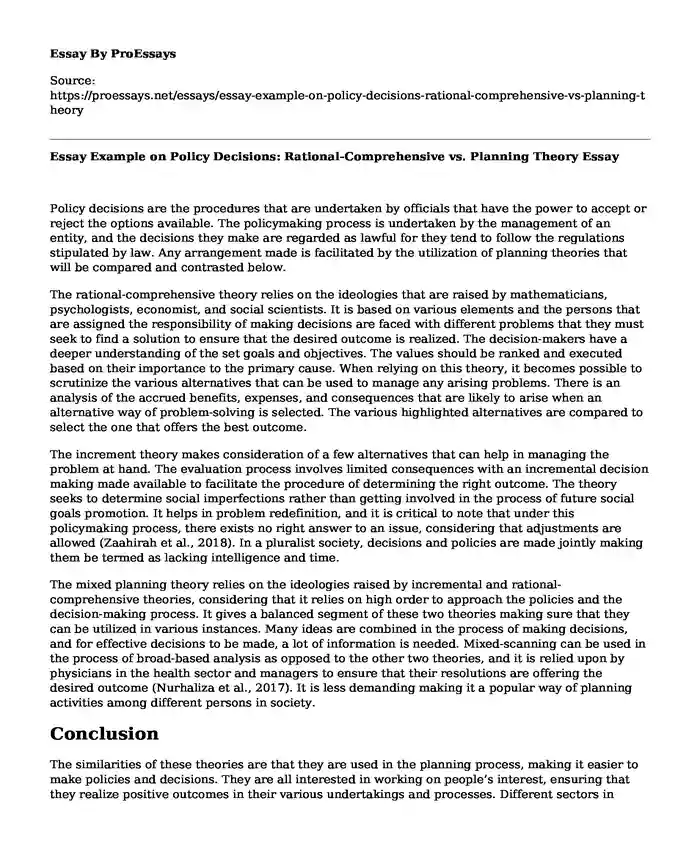Policy decisions are the procedures that are undertaken by officials that have the power to accept or reject the options available. The policymaking process is undertaken by the management of an entity, and the decisions they make are regarded as lawful for they tend to follow the regulations stipulated by law. Any arrangement made is facilitated by the utilization of planning theories that will be compared and contrasted below.
The rational-comprehensive theory relies on the ideologies that are raised by mathematicians, psychologists, economist, and social scientists. It is based on various elements and the persons that are assigned the responsibility of making decisions are faced with different problems that they must seek to find a solution to ensure that the desired outcome is realized. The decision-makers have a deeper understanding of the set goals and objectives. The values should be ranked and executed based on their importance to the primary cause. When relying on this theory, it becomes possible to scrutinize the various alternatives that can be used to manage any arising problems. There is an analysis of the accrued benefits, expenses, and consequences that are likely to arise when an alternative way of problem-solving is selected. The various highlighted alternatives are compared to select the one that offers the best outcome.
The increment theory makes consideration of a few alternatives that can help in managing the problem at hand. The evaluation process involves limited consequences with an incremental decision making made available to facilitate the procedure of determining the right outcome. The theory seeks to determine social imperfections rather than getting involved in the process of future social goals promotion. It helps in problem redefinition, and it is critical to note that under this policymaking process, there exists no right answer to an issue, considering that adjustments are allowed (Zaahirah et al., 2018). In a pluralist society, decisions and policies are made jointly making them be termed as lacking intelligence and time.
The mixed planning theory relies on the ideologies raised by incremental and rational-comprehensive theories, considering that it relies on high order to approach the policies and the decision-making process. It gives a balanced segment of these two theories making sure that they can be utilized in various instances. Many ideas are combined in the process of making decisions, and for effective decisions to be made, a lot of information is needed. Mixed-scanning can be used in the process of broad-based analysis as opposed to the other two theories, and it is relied upon by physicians in the health sector and managers to ensure that their resolutions are offering the desired outcome (Nurhaliza et al., 2017). It is less demanding making it a popular way of planning activities among different persons in society.
Conclusion
The similarities of these theories are that they are used in the planning process, making it easier to make policies and decisions. They are all interested in working on people’s interest, ensuring that they realize positive outcomes in their various undertakings and processes. Different sectors in society rely on these theories in managing their activities for they seem to have their weaknesses and strengths. However, in general, they are all playing a critical role in the effective decision-making processes, and they are working on resolving the problems that are facing the decision-makers. Managers in a firm are presented with the issue of finding the best mixture of activities that will deliver the desired outcome. In such cases, the presence of alternatives is not a hindrance to the completion of an activity, considering that these planning theories helps in the selection of the procedure that will derive the desired outcome.
References
Nurhaliza, Z., Nazatul Yusrina, M. Y., Farah Fatin, F., Netto, E., Mohd Safwan, I., Anthony, N. T. R., ... & Juni, M. H. (2017). Analysis of health planning theories–a systematic approach. International Journal of Public Health and Clinical Sciences, 4(3), 14-22.
Zaahirah, M., Juni, M. H., & Rosliza, A. M. (2018). Planning theories in primary health care planning. International Journal of Public Health and Clinical Sciences, 5(4), 12-28.
Cite this page
Essay Example on Policy Decisions: Rational-Comprehensive vs. Planning Theory. (2023, Sep 22). Retrieved from https://proessays.net/essays/essay-example-on-policy-decisions-rational-comprehensive-vs-planning-theory
If you are the original author of this essay and no longer wish to have it published on the ProEssays website, please click below to request its removal:
- Advantages and Disadvantages of Making Policies that Fund Scientific Research
- Essay Sample on Stereotyping in Workplace: Harmful Impact on Organizational Culture
- What Does It Mean Being a Cheerleader Captain Essay
- National Security vs. Civil Liberties: Balancing Rights and Safety - Essay Sample
- Essay Example on Friendship Conflict: Resolving Disputes Before Damage is Done
- Paper Example on Infants Drug Withdrawal: Nurses, Acuity & Parental Needs
- Essay Exploring Themes in Jesmyn Ward's 'Sing, Unburied, Sing': Family, Race, and Death







